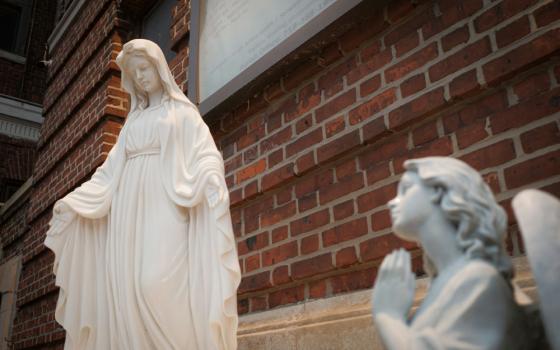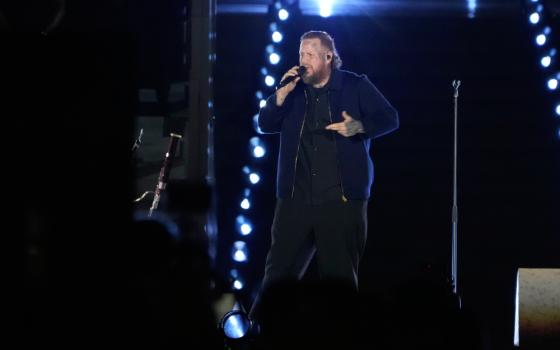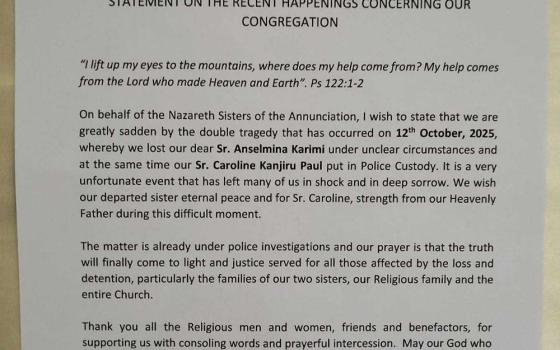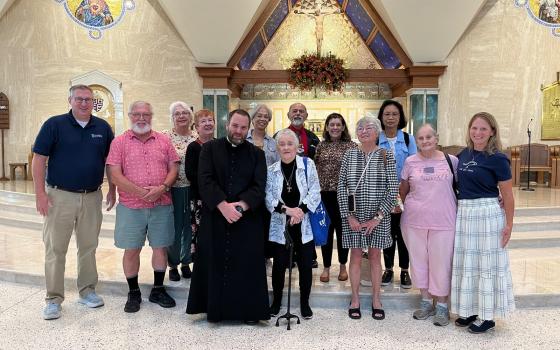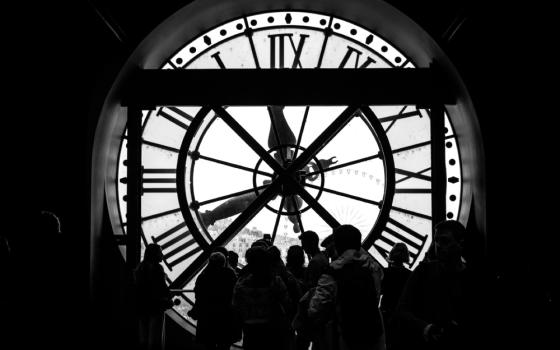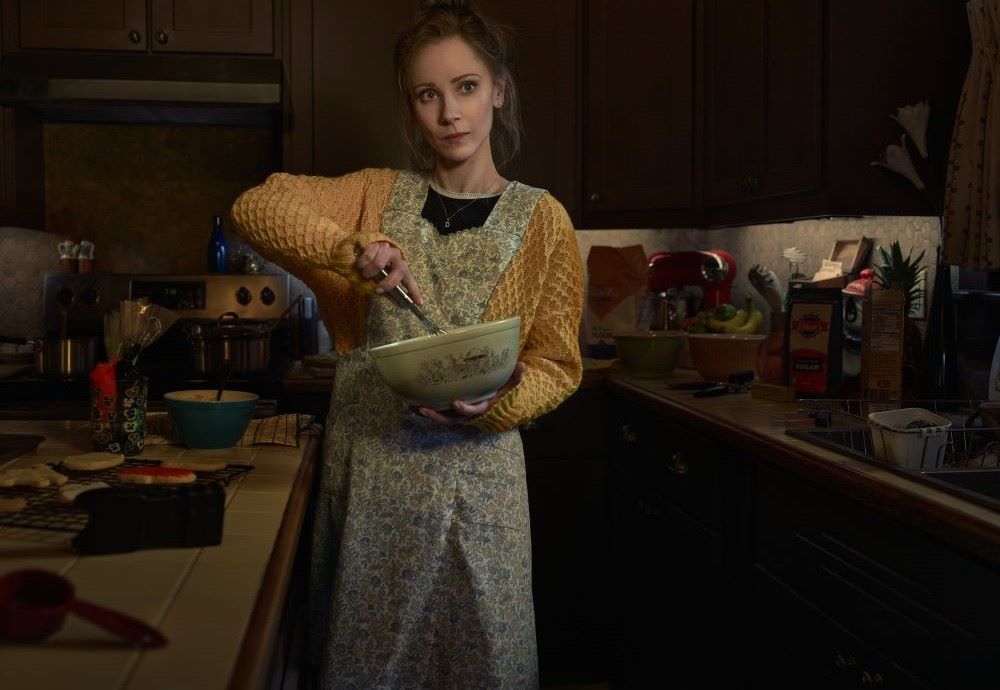
Juno Temple portrays Dorothy "Dot" Lyon in Season 5 of the television series "Fargo." (Courtesy of FX)
Editor's note: This review contains spoilers.
In June of 2022, on the feast of the Most Holy Body and Blood of Jesus Christ, the U.S. Conference of Catholic Bishops launched a three-year National Eucharistic Revival. Its mission, they said, was "to renew the Church by enkindling a living relationship with the Lord Jesus Christ in the Holy Eucharist." After an initial year dedicated to diocesan renewal, the current year has been intended to renew dedication to the Eucharist at the parish level, culminating with a four-day national Eucharistic Congress to be held in Indianapolis in July, the first such event to be held in the United States in almost a century.
Here in New York City where I live, 61 parishes held eucharistic processions in June to mark the beginning of the second year. The archdiocese is also promoting a number of parishes who offer eucharistic adoration, including what is billed as the archdiocese's "first-ever" perpetual adoration chapel at St. Joseph's Church in Greenwich Village. These events have no doubt had a positive effect on those who have participated, and perhaps on others as well. But personally the most profoundly meaningful experience of the eucharist I've witnessed in the last year occurred not in a church, but on the Hulu TV series "Fargo." And I think the National Eucharist Revival could learn a lot from it.
Spun off from the bloody, tender and hilarious Oscar-winning film, each season of Fargo tells the story of a different group of people located in and around Minnesota at different points in time. The most recent season, Season 5, tells the story of Dorothy "Dot" Lyon (Juno Temple), a suburban housewife whose loving husband and daughter do not know that as a teenager she escaped from a violent marriage to the rabidly conservative North Dakota Sheriff Roy Tillman (Jon Hamm). When a riot in a school board meeting lands Dot accidentally in jail, Tillman is able to discover where she is and sends groups of armed men to kidnap her, including a relentless assassin named Ole Munch (Sam Spruell).
Oftentimes the only way we come to conversion is by way of the things we don't expect, especially things that are radically disruptive to our way of thinking.
As Dot sheds her mousy mom exterior to fight for the life she has made for herself, religion comes up repeatedly, usually in the context of debt. The unhinged but popular Tillman insists that Dot made a promise before God to be his wife, which in his mind means she is his possession, and he has every right to take her back, even though he has since remarried.
At the same time, he and his dopey son Gator (Joe Keery) have no trouble repeatedly betraying their promises to the spooky Munch, who unbeknownst to them is a Cain-like immortal, trapped walking the Earth for centuries since he participated in a weird religious ceremony in which he symbolically consumed the sins of a dead man. Just as for Tillman, for Munch one's word creates a debt that must be collected.
In the climax of the series, Dot, Lorraine, Munch and many police agents work together to bring down Tillman once and for all. Dot and her husband and daughter return to their happy lives, the ordeal that they have been through having brought them together even more strongly. But a year later, while the family prepares dinner, Munch shows up, saying he is still owed a debt by Dot for having lost part of an ear when he first tried to seize her for Tillman.
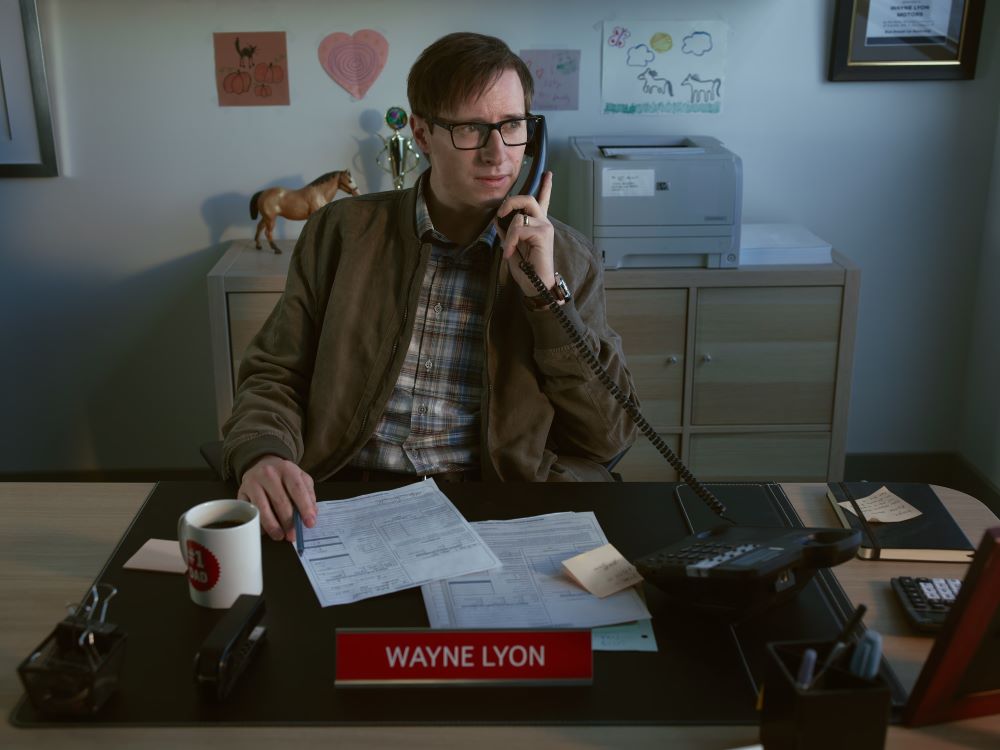
David Rysdahl portrays Wayne Lyon in Season 5 of the television series "Fargo." (Courtesy of FX)
To see this man who has moved through much of the series as almost a supernatural force of destruction sitting in the Lyon family living room with Dot's oblivious husband Wayne and daughter Scotty is about as frightening a moment as Fargo has ever produced. Wayne (the wonderful David Rysdahl) talks Munch up with the kind of authentic warmth the series often ascribes to Midwesterners, while Dot looks on in horror. But then, having herself spent the series demonstrating an astonishing capacity for violence in order to ensure her safety and that of others, Dot chooses a new path, asking the question, Why must a debt be paid?
"Isn't the better thing, the more humane thing," she asks, "to say that debt should be forgiven? Isn't that who we should be?"
As he sits contemplating this, she tells him "It's a school night." He can either wash his hands and help them finish their chili dinner, or come back some other time. In a hilarious (and yet still frightening) end sequence, a dazed Munch joins the family in the kitchen making Bisquick biscuits while he struggles with the choice before him. Finally they sit down to dinner.
After saying grace, Munch's own heart-rending story pours out of him, how everything good in his life was stripped away until "all that is left is sin." To Dot, who has been through such trauma herself, this makes perfect sense. "It feels like that," she agrees. "What they do to us, make us swallow, like it's our fault." But there's a cure, she says, taking one of his biscuits and offering it to him: "Eat something made with love and joy, and be forgiven."
Advertisement
We believe the Eucharist is both the real presence of Jesus Christ and a sacrament of reconciliation. Those two aspects can't be separated; the Eucharist heals us because it is Jesus. And yet when you look at the language and activity of the Eucharistic Revival, it often focuses exclusively on the real presence. The USCCB's own press release for the kickoff of Year 2 describes the revival as "a nationwide multi-year initiative to restore belief in the Real Presence." The events of the year have likewise tended to focus on moments in which the Eucharist is not received by people as merciful nourishment, but raised up to be worshiped.
Perhaps it will offend some reading this to think that an often-violent and irreverent television show might have more to say about the Eucharist than a three-year national movement organized by the leaders of the Catholic Church in the United States and costing $28 million. But as Catholic author Flannery O'Connor demonstrated in her work, oftentimes the only way we come to conversion is by way of the things we don't expect, especially things that are radically disruptive to our way of thinking.
I certainly hope that the National Eucharistic Revival has a positive impact on people. But if its events and language do not have at their foundation the invitation for people to "eat something made with love and joy, and be forgiven," I think it will have missed the most important opportunity of all. And also our most fundamental need.

